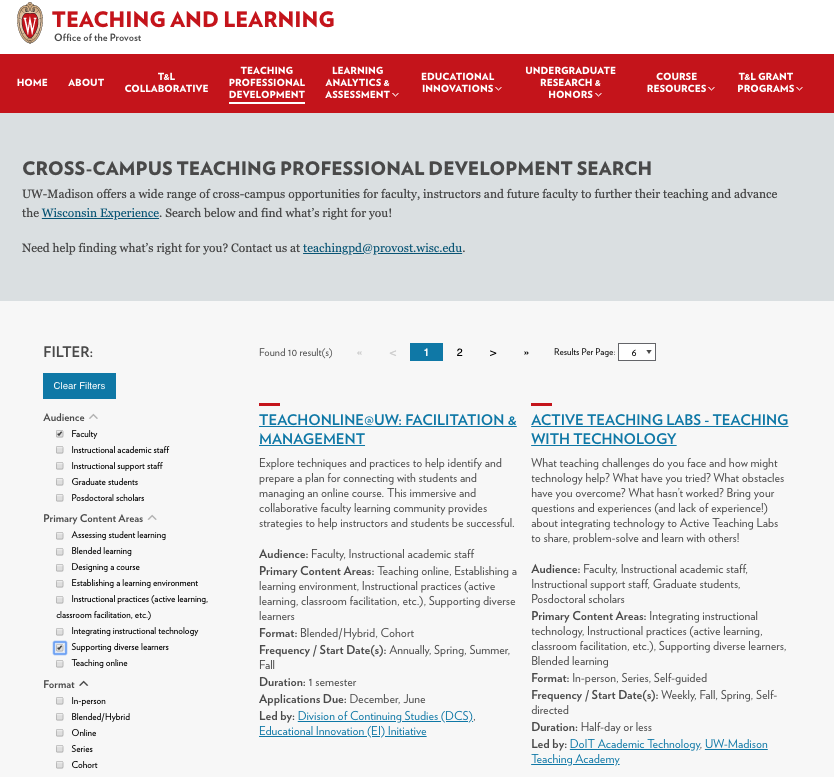Supplemental Resources: Supporting Student Learning
Campus Resources – Teaching, Learning, and Wellbeing
Page Navigation: Campus Support Resources | Faculty Advising Guidance | Events & Workshops
Campus Support Resources
The Healthy Academics Toolkit
The UW-Madison Healthy Academics Toolkit is a data-driven tool to support a shift in policies, practices, and pedagogies in academic contexts across campus, including classrooms, research labs, and advising offices. It offers specific strategies and resources that can be implemented to proactively support the health and wellbeing of both undergraduate and graduate students.
Self-Care and Mental Health Support Resources for Students, TAs, Faculty, and Staff
This informal, expanding Google Document resource outlines the basic services that many of the major support resources on campus provide.
- (If you’re viewing this page in Canvas, the link above may generate an error message. This link will open this UW Campus support resources page in a new tab.)
Many faculty members and graduate students are unaware of the resources that are available to them. This resource exists to provide easily-accessible information for reference. This guide differs from other overviews of UW campus resources in that it includes a color-coded description of which audiences each campus unit serves: undergraduate students, graduate students and teaching assistants, or faculty and instructional staff.
EXAMPLE:
| Resource Hyperlink |
Description |
Under- graduate students (UG) |
Graduate Students & TAs (GS) | Faculty & Instructional Staff (F/S) |
| UW-Madison Ombuds Office | The UW-Madison Ombuds Office provides faculty, staff, and graduate student employees with a confidential, impartial place to explore complaints, clarify issues, and consider options and resources to address their concerns. The Ombuds Office is not designated by UW-Madison as an entity authorized to receive reports of university policies or of unlawful practices. Therefore, communications made to the Ombuds Office regarding possible violations do not constitute notice to UW-Madison. This provision ensures the freedom of ombuds to work independently and confidentially with individuals seeking assistance. | (UG) – specifically for campus employment workplace issues | (GS) – yes | (F/S) – yes |
Instructor Referral Guide – Center for the First-Year Experience
The CFYE Instructor Referral Guide – (v. 1.2019) is a handy one-page document that identifies resources for students. It’s organized by area of need—for instance, “study skills,” “food insecurity,” etc. We highly recommend keeping a copy on hand in your office.
Dean of Students Office – Resources for Faculty and Staff
The Office of Student Assistance and Support (OSAS) Faculty & Staff Resource List provides a series of how-to guides on topics such as addressing disruptive classroom behavior, supporting students’ mental health, and more. It also discusses FERPA policy and includes direct links to the separate services OSAS provides–(for example, drop-in consulting, Student of Concern forms, and Undocumented Student Support).
Campus-Supported Resource: National Center for Faculty Development and Diversity
As a member of UW-Madison, you have access to our institution’s membership in the National Center for Faculty Development and Diversity. This is a great resource chock full of teaching resources, webinars, and community connection platforms.
A lot of the NCFDD material is pitched to tenure-track faculty. The center discusses practices for academic productivity, writing, avoiding burnout, etc. They also feature some resources specifically for students, graduate students, and administrators.
It can be difficult to juggle research and teaching requirements during the semester. In addition to its teaching support materials, the NCFDD hosts an occasional two-week online “writing retreat”—essentially a short daily online check-in and optional chat room where writers of all academic positions and ranks share their daily writing goals and challenges and track their progress.
Faculty Advising
Guide to Effective Advising – NSF Aspire Alliance
In Fall 2019 the NSF Aspire Alliance released a new resource for faculty about effective advising. While most of the examples are tailored to STEM faculty, the Guide should translate easily across disciplines.
The vision of the National Science Foundation-funded Aspire Alliance is to increase the learning, persistence, and completion of students from underrepresented groups (URG) in colleges and universities in science, technology, engineering, and mathematics (STEM). Faculty are a key leverage point in the success of URG undergraduate students. When URG students are taught by URG faculty, they achieve at significantly higher rates. Research also reveals that inclusive teaching, mentoring and advising each leads to enhanced performance, self-efficacy, and STEM identity, which foster persistence. In addition, while academic advising in higher education has been professionalized and its importance in student success recognized, faculty advising has not yet experienced the advancement in scholarship, theory and practice that is needed.
The National Change Team of the Aspire Alliance is working to provide current and future faculty with training in advising (and teaching and mentoring) so that they can improve their own repertoire of skills to be effective educators for students from all backgrounds.
- NSF Aspire Alliance’s Guide to Academic Advising for STEM Faculty (free, downloadable pdf):
https://www.aspirealliance.org/national-change/national-change-resources/faculty-advising-guide
Please send colleagues to the website to download the pdf – the Inclusive Teaching team at UW-Madison is tracking downloads.
Campus Events and Workshops
*Summer 2024 note: We’ll be updating this page with current resources asap.
(No longer active) The UW-Madison Cross-Campus Teaching Professional Development Search
This search tool allows you to use search filters to identify an audience (faculty, grad students, etc.), a primary content area (course design, supporting diverse learners, etc.), a format, and a duration. From there, you can find the latest information on teaching professional development opportunities that suit your needs.
This is an especially useful tool for faculty interested in expanding their teaching aptitude or for recommending workshops relevant to the graduate instructors who work with them.


